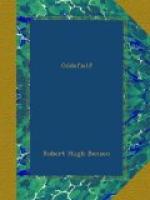“You will find a great many changes,” he said; “and I think we are on the eve of some more. Certainly His Majesty has wonderfully established his position; and yet, if you understand me, there is a great and growing disaffection. It is the Catholic Faith that they fear; and I cannot help thinking that some victims may be required again presently, though I do not know what they can allege against us. There is a deal of feeling, too, against the Queen; she has borne no children—that is true; but the main part of it arises from her religion: and so with the Duke of York also. Certainly we are in the fashion in one way: but those who are on the top of the wave must always look to come down suddenly.”
Here again, Father Whitbread did not tell me anything that I did not know; yet he put matters together as I had not heard them put before; and he seemed to me altogether a shrewd kind of man whose judgment I might very well rely upon; and as we went up the Strand he spoke again of the Queen.
“His Majesty hath been urged again and again to divorce her; but he will not. He said to the Duke himself in my hearing one day that an innocent woman should never suffer through him—which is good hearing. But Her Majesty is not very happy, I am afraid.”
When we came to the Maypole, which I had already seen, in the midst of the Strand, he spoke to me of how it had been carried there and set up with great rejoicing, after the Restoration. It was a great structure, hung about by a crown and a vane; and he said that it stood as a kind of symbol against Puritanism.
“There are many,” he told me, “who would pull it down to-morrow if they could, as if it were some kind of idol.”
He saw me as far as the door of my lodgings; but he would not come in. He said that he had no great desire to be known more widely than be was at present known.
“But if you have time to come in to-morrow morning about ten o’clock to Mr. Fenwick’s lodgings in Drury Lane—over the baker’s shop—I shall be there, and Mr. Ireland also—all Fathers of our Society; and I will very gladly make you known to them. My own lodgings are in Weld Street—at the Ambassador’s.”
I thanked him for his kindness, and said I would be there; and so I bade him good-night.
* * * * *
Although I had learned very few things that day which I had not known already, I felt that evening as I sat at supper, and afterwards, in the coffee house at 17, Fleet Street (which he recommended to me) that I knew them in a different manner. For I had spoken with some of the principal actors, and, above all, with the King himself. My cousin questioned me delightedly upon my experiences when we were alone with our pipes at one end of the great room that had been a council-chamber; and related to me all his own experiences with the King at great length; and how Charles had made to him some witty remarks which




